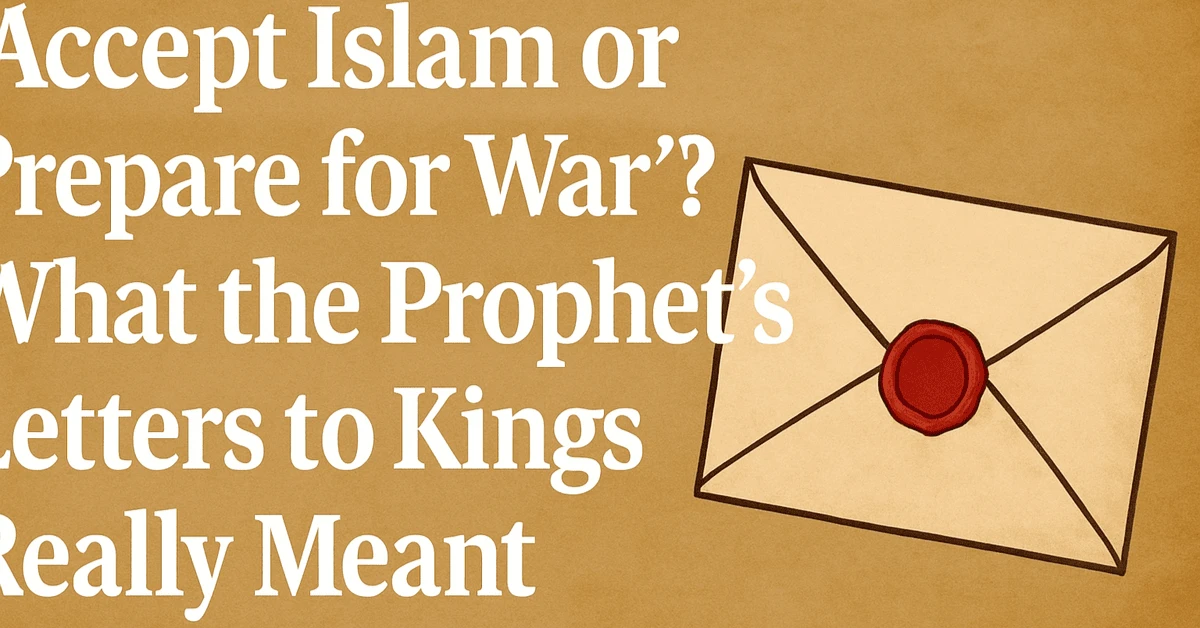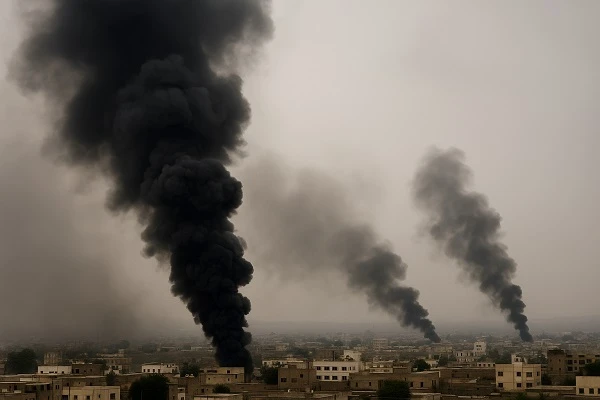Last Updated: October 9, 2025
“Accept Islam or Prepare for War”? What the Prophet’s Letters to Kings Really Meant

Hook: One of the most dramatic episodes in early Islamic history is short and simple on paper: the Prophet Muhammad ﷺ sent letters to emperors and kings — Heraclius of Byzantium, Khosrow of Persia, the Negus of Abyssinia, and others — inviting them to Islam. Online debates often reduce that event to a slogan: “accept Islam or face war.” That reading is shallow and misleading. When we examine the letters, the historical context, and the Prophet’s behavior, a clearer and more measured picture appears: these were diplomatic invitations and conditional political warnings, not blanket threats to force belief.
Why these letters still matter
The letters touch on urgent contemporary issues: religious freedom, the ethics of proselytizing, state relations, and the use of force. Misreading them fuels polarizing narratives and can be used to justify violence. Understanding what the letters truly signified helps prevent such misuse and highlights the Prophet’s consistent preference for persuasion, treaties, and restraint.
Historical context — how a local movement became an international actor
By the late 620s CE the Muslim community in Medina had evolved from a persecuted pocket of believers into a recognized polity that signed treaties and defended its frontiers. The Treaty of Hudaybiyyah (628 CE) is a turning point: it brought a period of relative peace that allowed Muslim da’wah to expand beyond the Arabian Peninsula. Sending letters was a natural diplomatic step — the new polity was announcing its presence, inviting rulers to the faith, and defining its expectations for respectful interstate conduct.
What the letters contained — invitation, assurance, and conditional warning
Reports of the letters show three recurring elements:
- Invitation — an offer to accept Islam as the true religion and join the community of believers.
- Assurance — a promise of safety, dignity and protection to those who accept or live peacefully under Muslim governance.
- Conditional warning — a statement that if the addressee chooses hostility (attacking envoys, raiding borders, violating treaties), then political consequences would follow.
Crucially, the consequences were tied to political hostility, not private unbelief. That distinction is the key to correct interpretation.
Diplomatic language of the era — “prepare for war” as formal warning
Late Antiquity and the early medieval Near East featured a formal diplomatic language. Royal letters often combined moral exhortation with stern warnings to show seriousness and sovereign legitimacy. Phrases that sound aggressive to modern ears would at the time communicate: “Treat this seriously — we are a polity and we expect our rights and security to be respected.” That does not remove the possibility of force, but it places the move to force within a conditional, political framework.
Case study: Heraclius — respectful reception, no immediate war
The letter to Heraclius is the case most frequently cited by critics and by those seeking to clarify the tradition. Surviving accounts report that the Prophet ﷺ sent a courteous invitation and that Heraclius received it with interest. He is said to have questioned Abu Sufyan (who later converted) about the Prophet’s character and concluded the message deserved consideration. Importantly, Heraclius did not attack the Muslim community; there was no military confrontation between him and the Prophet during the Prophet’s lifetime. Later military engagements between Muslims and Byzantines occurred after the Prophet’s death and were driven by shifting local dynamics and border conflicts, not by a direct reaction to that letter.
Case study: Khosrow and other rulers — reactions mattered
Accounts differ about how Khosrow (the Sasanian emperor) and other rulers reacted. One well-known report says Khosrow tore the letter, an act taken as contempt by Muslim chroniclers. When rulers or their agents harmed envoys or openly violated diplomatic norms, such acts were treated as hostile and could justify armed response. Again, the trigger was political hostility — harming envoys or breaching treaties — not the mere rejection of a religious message.
The Prophet’s overall method — invitation, patience, and restraint
Across the Prophet’s life there exists a clear pattern: persistent invitation (da’wah), patient acceptance of rejection, and a principled prohibition of compulsion in religion. The Qur’anic injunction “There is no compulsion in religion” (Q. 2:256) was not an accidental aside — it is central to the Islamic ethic of belief. The Prophet’s post-conquest conduct in Mecca — granting amnesty to many former opponents and protecting places of worship — underscores that genuine faith cannot be produced by force. Military action occurred only under specific political circumstances: self-defense, broken agreements, or active aggression.
Classical legal categories — how jurists framed military obligations
Classical Islamic jurisprudence distinguishes different legal obligations relevant to war:
- Fard ‘Ayn (individual obligation): In urgent cases of invasion or existential danger, defense becomes an individual duty on every capable Muslim.
- Fard Kifayah (communal obligation): In other situations a communal response — under legitimate authority — suffices; not every individual must fight but some must take action to secure justice and safety.
These categories place the decision to use force within institutional, legal, and ethical parameters. Declaration of hostilities or campaigns normally required recognized authority; armed groups outside that authority could not claim canonical legitimacy to wage war in Islam’s name.
When does “prepare for war” actually apply?
Bringing the principles into a simple operational rule: the determining factor is hostility, not mere refusal. The practical checklist reads:
- Peaceful refusal: A ruler who hears the invitation and refuses but remains peaceful — honors treaties and refrains from aggression — does not justify invasion.
- Blocking outreach peacefully: If a state prevents missionaries from entering but does not attack or persecute, response should be diplomatic and legal, not military.
- Active hostility: If a state persecutes Muslims, harms envoys, raids border settlements, or breaks agreements, these are acts of aggression that may trigger defensive or corrective measures by a legitimate authority.
Under this reading, “prepare for war” is a conditional political warning: aggression will be met with an appropriate political response.
Moral and practical reasons against forced conversion
There are both moral and practical reasons why Islam forbids forced conversion. Morally, faith is meaningful only if freely embraced; forced belief becomes hypocrisy. Practically, forced conversions destabilize societies and undermine the social contract that allows religious pluralism to function. The Prophet’s subsequent policies — protections for non-Muslims, respect for property and places of worship, and use of jizya (as a tax arrangement replacing military obligations) — reflect a pragmatic system for managing diverse societies without coercion.
Common misconceptions — direct responses
Misconception: The letters were ultimatums: accept Islam or be invaded.
Reality: The letters combine invitation with a political warning. Consequences were keyed to hostile actions, not mere disbelief.
Misconception: The Prophet sought to conquer and convert by force.
Reality: The prophetic record emphasizes persuasion first, then defensive measures only where political hostility existed.
Misconception: Barring da’wah is an automatic cause for war.
Reality: International law and Islamic principles both prioritize nonviolent means. Excluding missionaries is a political act best handled by diplomacy unless accompanied by aggression.
Lessons for modern readers and policymakers
The historical episode yields four lessons for today:
- Prioritize peaceful engagement: Diplomatic outreach and respectful communication should be the first tools of interstate and interfaith relations.
- Protect freedom of conscience: Authentic religious outreach depends on free choice; coercion delegitimizes belief and creates instability.
- Authority and legality matter: Decisions about force belong to legitimate institutions operating under legal and moral constraints; non-state violence lacks religious legitimacy.
- Context is everything: Interpret historical texts within their diplomatic, cultural, and political context to avoid modern misreadings and misuse.
How to present this story in your article (brief guide)
To make your piece clear, credible, and shareable:
- Lead with a striking quote from a letter, then immediately place it in context.
- Use Heraclius and Khosrow as narrative case studies to show different responses.
- Explain the distinction between political hostility and personal disbelief.
- Reference Qur’anic principles (e.g., “no compulsion in religion”) and the Prophet’s conduct to underscore the ethic of persuasion.
- Close with lessons for today about diplomacy, rights, and restraint.
FAQs
Q: Did the Prophet ever attack Heraclius?
A: No. Heraclius received the Prophet’s message and there was no direct military confrontation between him and the Prophet during the Prophet’s lifetime. Later wars involving Byzantium occurred after the Prophet’s death for a variety of political reasons.
Q: If a country bars missionaries today, does Islam allow invasion?
A: No. Barring missionaries is a political decision and should be addressed with legal and diplomatic tools. Military action is not justified for mere refusal to allow da’wah; only active aggression (persecution, attacks, treaty violations) could implicate defensive responses.
Q: Were the letters meant to coerce rulers into Islam?
A: No. The letters were invitations that included diplomatic assurances and conditional warnings. They aimed to open channels of communication and protect Muslim interests; coercion was not their intent.
Q: Who historically could declare war in Islamic polity?
A: Historically, legitimate political authorities (the Prophet in his role as state leader, and later caliphs or recognized rulers) had the remit to mobilize forces. Unilateral armed groups lacked canonical authority to declare war on behalf of the community.
Conclusion — read history responsibly
The Prophet’s letters to kings are best read as diplomatic outreach with conditional warnings tied to political behavior. They were not blank checks to invade non-Muslim lands for refusing the faith. The underlying principles — persuasion over coercion, protection of rights, and restraint in the use of force — remain relevant. For modern readers, the challenge is to interpret historical texts fairly, resist sensational simplifications, and apply the ethical lessons toward peaceful coexistence.
You May Also Like:

The Silent War on Undersea Cables: Who Really Controls the Internet’s Backbone?...

Navigating the Storm: How the US-China Trade War is Reshaping Nvidia and the Tech Sector...

The AI War: Is Humanity Losing Control?...

US Airstrike Targets Houthi-Controlled Oil Site in Yemen: What Really Happened...

The Post-Messi-Ronaldo Era: Who’s Really Carrying Football’s Global Popularity Now?...

ICC Issues Arrest Warrant for Netanyahu: What It Really Means...

Naseem Shah House Tragedy Today: What Really Happened?...
